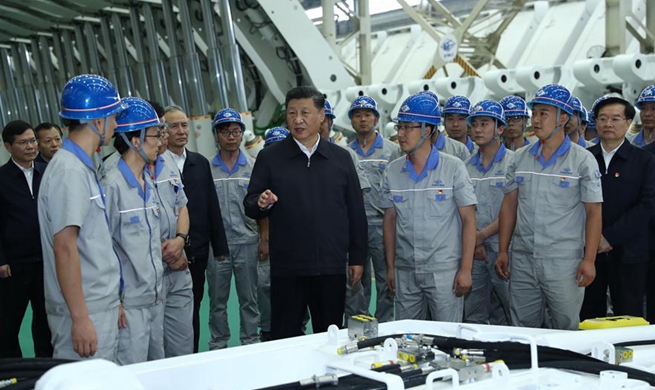HANGZHOU, Sept. 20 (Xinhua) -- For Xu Yun, 62, the hardest thing in the world had been to get all her neighbors' approval to add an elevator to their six-story apartment building.
"The government encourages the installation of elevators in old residential buildings. But it needs all households in a building to agree on the matter," said Xu, a retiree in Hangzhou, capital of east China's Zhejiang Province.
Adding an elevator violates some households' interests, as it will take up space and cause noise. But for seniors like Xu living on higher stories, walking up so many stairs can be tiring. Besides, over half of the residents in the building are now aged.
Her elevator dream was finally realized last year after a consensus was reached with the efforts of a self-governance team.
To solve the problem, residents set up a special management panel, which held more than 10 meetings and negotiated with the elevator design company to take into considerations of all suggestions so that all households could agree upon adding the elevator.
"Neighborhood affairs may be trivial, but they need approvals of all residents to decide, requiring negotiations chaired by a committee," said Zou Zijuan, secretary of the Communist Party of China committee of the Shangyangshi Street community.
Such kind of primary-level democracy was by no means new to people in Shangyangshi Street community, as the country's first neighborhood committee was set up here on Oct. 23, 1949, less than a month after the founding of the People's Republic of China.
In 1949, some 200 representatives of 2,000 residents in the street community cast votes to elect a neighborhood committee director. By the end of the 1980s, neighborhood committees had been set up in all cities across China.
The committees take care of every aspect of residents' life, explaining government policies and regulations, mediating in neighborhood disputes and organizing community activities.
"Neighborhood committees are China's primary-level social management organs, ensuring residents' self-governance in the country," said Xia Xueluan, professor of sociology at Peking University.
The committees make it possible for residents to reach consensus on matters from petty disputes to big issues such as opening new roads and markets in their communities, said Zou.
It was the idea of letting residents negotiate their own affairs that gave rise to the neighborhood committee, said Zou.
Xu's neighbors have taken self-governance to a new level. For the elevator issue, the residents have even made detailed rules on managing the new elevator.
"With the elevator, going upstairs is no longer a problem for us, especially for the aged and the pregnant," Xu said.

















